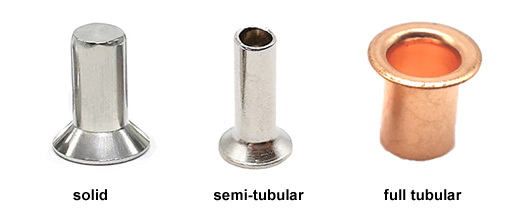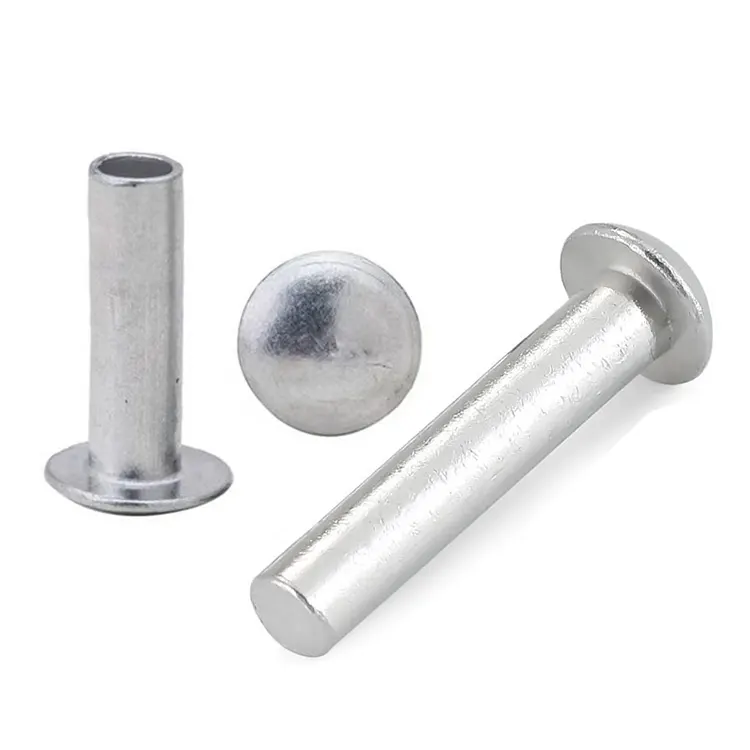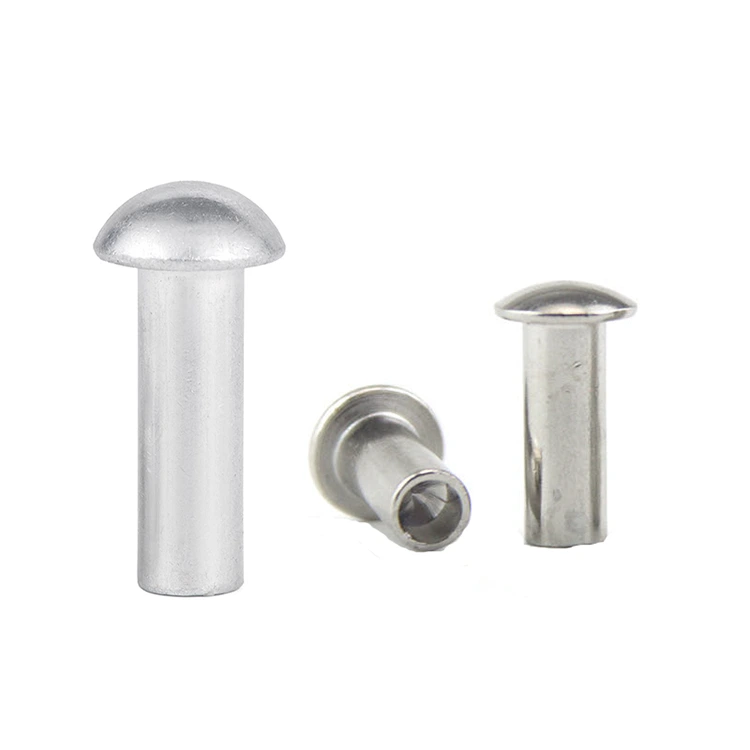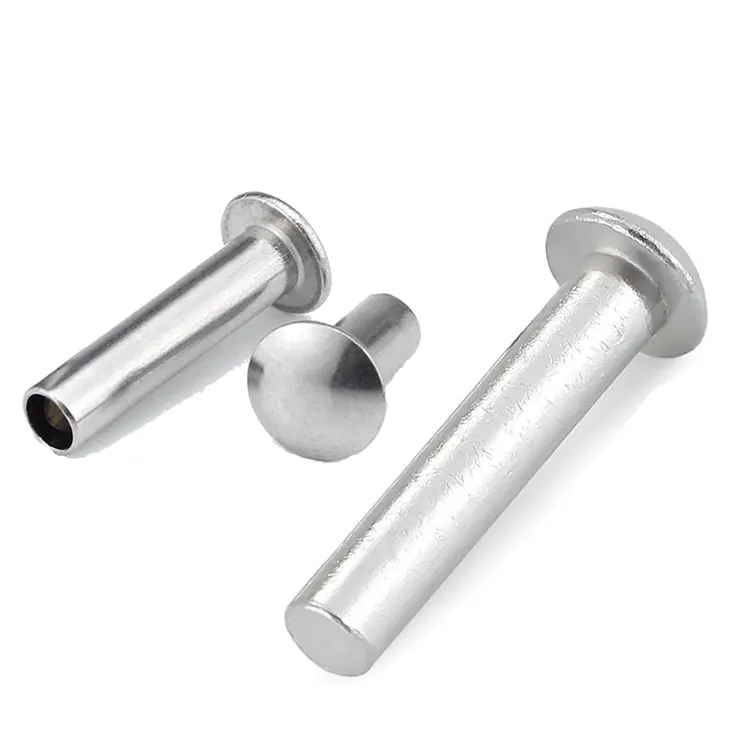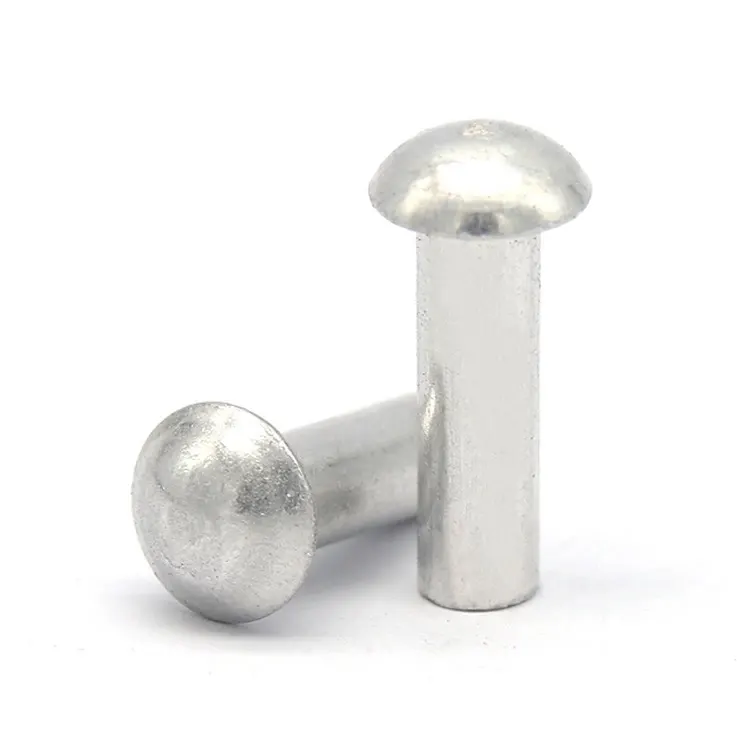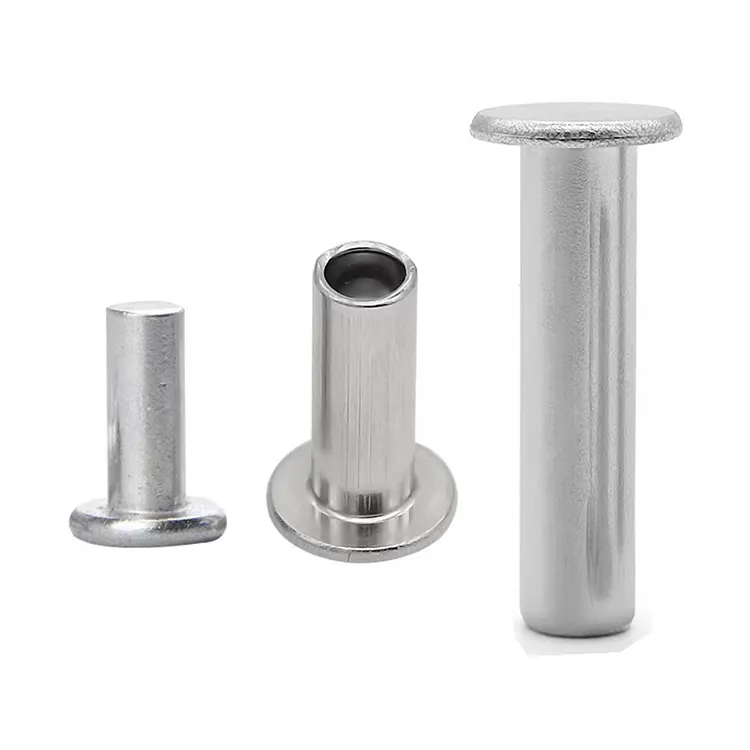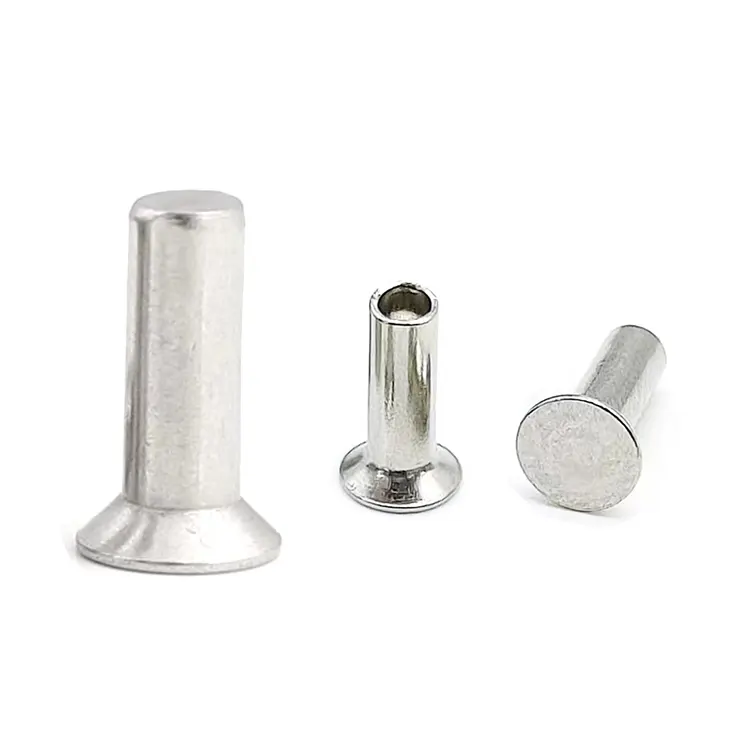Rivetti
As one of professional manufacturer in China, Notin would like to provide you Rivets. And we will offer you the best after-sale service and timely delivery.
What is a rivet?
A rivet is a permanent mechanical fastener used to join two or more materials. Rivets work by inserting a metal pin into an aligned hole and deforming the end, creating a strong, secure, and durable connection. Unlike temporary fasteners like screws, rivets do not rely on threads, but instead form a permanent connection, making them ideal for applications requiring high strength, durability, and vibration resistance.
Classification of Rivets
Rivets are typically categorized by head shape, degree of hollowness, or material.
Based on head shape, rivets can be classified as flat head rivets, round head rivets, countersunk head rivets, mushroom head rivets, universal head rivets, truss head rivets, etc.

Based on degree of hollowness, rivets can be classified as solid rivets, semi-tubular rivets, or full tubular rivets.
Based on material, rivets can be classified as brass rivets, stainless steel rivets, steel rivets, aluminum rivets, copper rivets, etc.
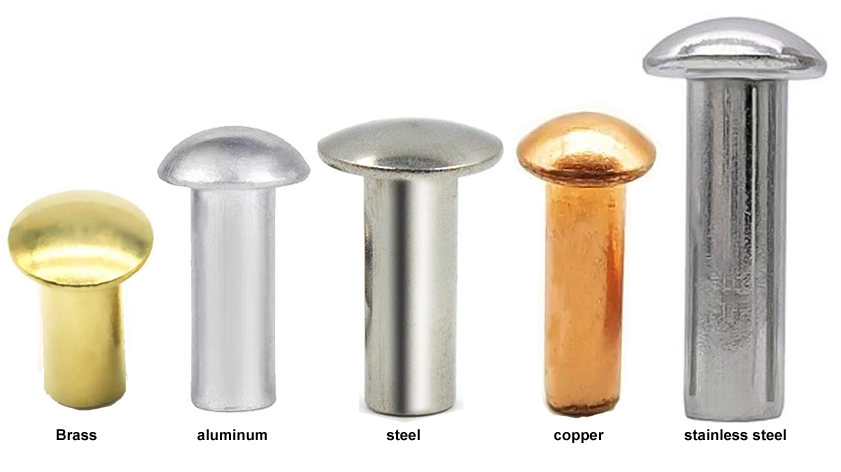
What surface finishes are available for rivets?
Rivet surfaces are typically treated with rust-proofing treatments, primarily electroplating, including zinc plating, nickel plating, chrome plating, tin plating, gold plating, and silver plating. Electroplating is a common rust-proofing method for rivets. It applies a layer of plating to the rivet surface through physical or chemical methods. The plating effectively prevents corrosion and rust, while also providing a certain aesthetic effect.
Another special surface treatment method is head coating. Head coating is performed after the rivet is electroplated. This allows for a variety of colors on the rivet head, achieving an aesthetically pleasing finish.
Aluminum rivets cannot be electroplated, but they can be anodized. Anodizing also allows for a variety of color options, but the unit price is higher than electroplating.
Rust-proofing the rivet surface is crucial, effectively extending the rivet's service life and ensuring a secure connection. Different rust-proofing methods are suitable for different environments and applications, so the choice should be tailored to the specific situation.
- View as
Rivetti a testa tonda in alluminio
I rivetti a testa tonda in alluminio sono ampiamente utilizzati in vari campi grazie alla loro leggerezza, elevata resistenza, resistenza alla corrosione ed eccellenti proprietà di connessione. Nuote Metals è un produttore cinese specializzato nella produzione di rivetti a testa tonda in alluminio. I nostri rivetti vengono esportati in tutto il mondo e diamo il benvenuto ai clienti che vengono a trovarci per domande.
Per saperne di piùInvia richiestaRivetti in alluminio
I rivetti in alluminio sono ampiamente utilizzati nella produzione meccanica, nell'edilizia, nel settore automobilistico, aerospaziale e in altri campi. Realizzati in solido alluminio, sono leggeri, resistenti alla corrosione e facili da lavorare. Nuote Metals è un produttore professionale di rivetti in alluminio, compresi rivetti pieni e semi-cavi, nonché varie forme di testa, come teste piatte, teste a cupola e teste svasate. Offriamo una gamma completa di specifiche e accogliamo favorevolmente gli ordini personalizzati.
Per saperne di piùInvia richiestaRivetti a testa cilindrica in alluminio
Come suggerisce il nome, i rivetti in alluminio a testa cilindrica sono rivetti in alluminio con testa a forma di coppa. Rispetto ai tradizionali rivetti a testa piatta, i rivetti in alluminio a testa bombata offrono maggiore resistenza al taglio e resistenza alla rottura durante il processo di rivettatura. Questo metodo di rivettatura viene spesso utilizzato per collegare componenti strutturali che richiedono maggiore sicurezza e protezione, come nelle applicazioni aeronautiche e automobilistiche.
Per saperne di piùInvia richiestaRivetti a testa di fungo in alluminio
I rivetti a testa a fungo in alluminio, grazie alle loro caratteristiche leggere, resistenti alla corrosione, esteticamente gradevoli e pratiche, svolgono un ruolo importante in numerose applicazioni. Nuote Metals, produttore cinese di rivetti, è specializzato nella produzione di rivetti con testa a fungo in alluminio. Possediamo migliaia di stampi per varie specifiche di rivetti e oltre 40 macchine rivettatrici, in grado di produrre decine di milioni di rivetti al giorno. Accogliamo con favore le vostre richieste.
Per saperne di piùInvia richiestaRivetti a testa piatta in alluminio
I rivetti a testa piatta in alluminio puro sono realizzati in alluminio puro e sono caratterizzati da leggerezza, resistenza alla corrosione ed eccellente conduttività elettrica. Sono adatti per applicazioni generali a bassa richiesta come mobili, elettrodomestici e costruzioni automobilistiche e navali. Tuttavia, la bassa resistenza dell'alluminio puro lo rende inadatto per applicazioni con carichi elevati. Nuote Metals è un produttore leader di rivetti a testa piatta in alluminio in Cina, esportando i nostri rivetti in tutto il mondo. Accogliamo con favore la vostra visita e richieste.
Per saperne di piùInvia richiestaRivetti a testa svasata in alluminio
I rivetti a testa svasata in alluminio sono elementi di fissaggio utilizzati per collegare due o più lamiere sottili. Le loro teste svasate consentono loro di rimanere a filo con la superficie dopo l'installazione, riducendo al minimo le sporgenze e rendendoli adatti per applicazioni che richiedono superfici lisce. Realizzati principalmente in alluminio, questi rivetti sono leggeri, resistenti alla corrosione e altamente conduttivi, il che li rende ampiamente utilizzati in settori quali l'aviazione, l'automotive, l'elettronica e l'edilizia.
Per saperne di piùInvia richiestaWhat are the advantages of rivets over other fasteners?
1. Ease of Installation
Rivets are fast to install, and even fully automated for high-volume applications, resulting in a simple and efficient operation process.
2. Connection Reliability
The riveting process is standardized, with strict quality control, resulting in highly stable connections. Visual inspection allows for quick verification of connection quality.
3. Vibration and Impact Resistance
Rivets connect through deformation or interference fit, providing strong clamping force and excellent vibration resistance, capable of withstanding vibration and shock.
4. Low Cost
Rivets are easy to install and can be fully automated, saving significant labor costs.
What are the advantages and disadvantages of rivets made of different materials?
Aluminum Rivets
Advantages: Lightweight, reduces overall product weight, low cost, suitable for general civilian applications.
Disadvantages: Low tensile and shear strength, unsuitable for high-strength workpieces, prone to electrochemical corrosion when in contact with metals such as stainless steel.
Stainless Steel Rivets
Advantages: Strong corrosion resistance, high hardness, suitable for high-strength workpieces (such as marine equipment)
Disadvantages: Higher cost, typically more expensive than aluminum rivets of the same specification.
Brass and Copper Rivets
Advantages: Excellent conductivity (such as connecting electronic components), good corrosion resistance.
Disadvantages: Higher cost, more difficult to process.
Steel Rivets
Advantages: High hardness, high connection reliability, and wide applicability.
Disadvantages: Compared to other materials, iron rivets are more prone to rusting.
What are the main applications of rivets?
Rivets have a wide range of uses, from small items like a pair of scissors to large items like airplanes and ships, as well as in high-precision medical applications.
Industrial Manufacturing
Rivets are used in a wide variety of industrial fields, wherever there is a need to connect two or more materials.
Electronics
Rivets secure heat sinks and chips, providing both vibration damping and noise reduction, and are widely used in the cooling systems of electronic products such as computers and mobile phones.
Automotive
Rivets are widely used to connect components of automobile bodies and chassis, such as doors and hoods. Their lightweight and corrosion-resistant properties make them an indispensable joining method in automotive manufacturing.
Aerospace
In aircraft manufacturing, rivets are used to connect different fuselage components, such as wings and tailplanes. Millions of rivets create high-strength, corrosion-resistant joints. Aluminum and titanium alloy rivets are often used to connect components of corresponding materials, ensuring stability in extreme environments.
Rivets are used everywhere. The above examples only represent a small number of their applications. We see rivets everywhere in our daily lives, such as on scissors, folding beds, and strollers etc. Rivets can be customized to different sizes and materials depending on the application.
Nuote Metals has specialized in the rivet industry for over a decade. Our factory is located in Dongguan, a city known as the "World Factory," a city with a developed industry and convenient transportation. This allows us to respond quickly when acquiring raw materials and supporting surface treatments, meeting our customers' needs for quick access to samples and bulk orders. We produce 10 million rivets daily and have molds of various specifications, allowing us to produce rivets as small as 0.8mm and as large as 10mm. We welcome your inquiries and visits.






